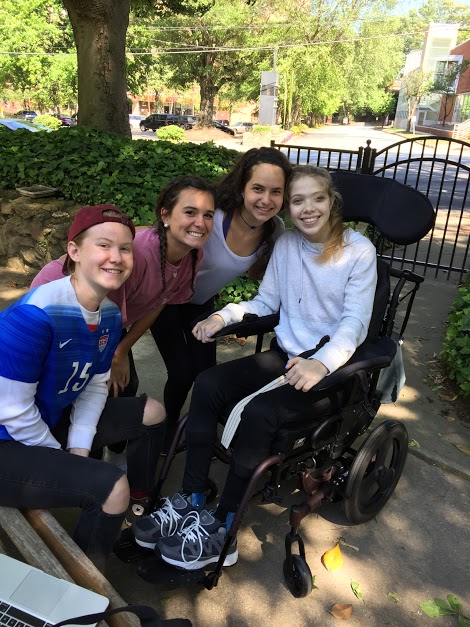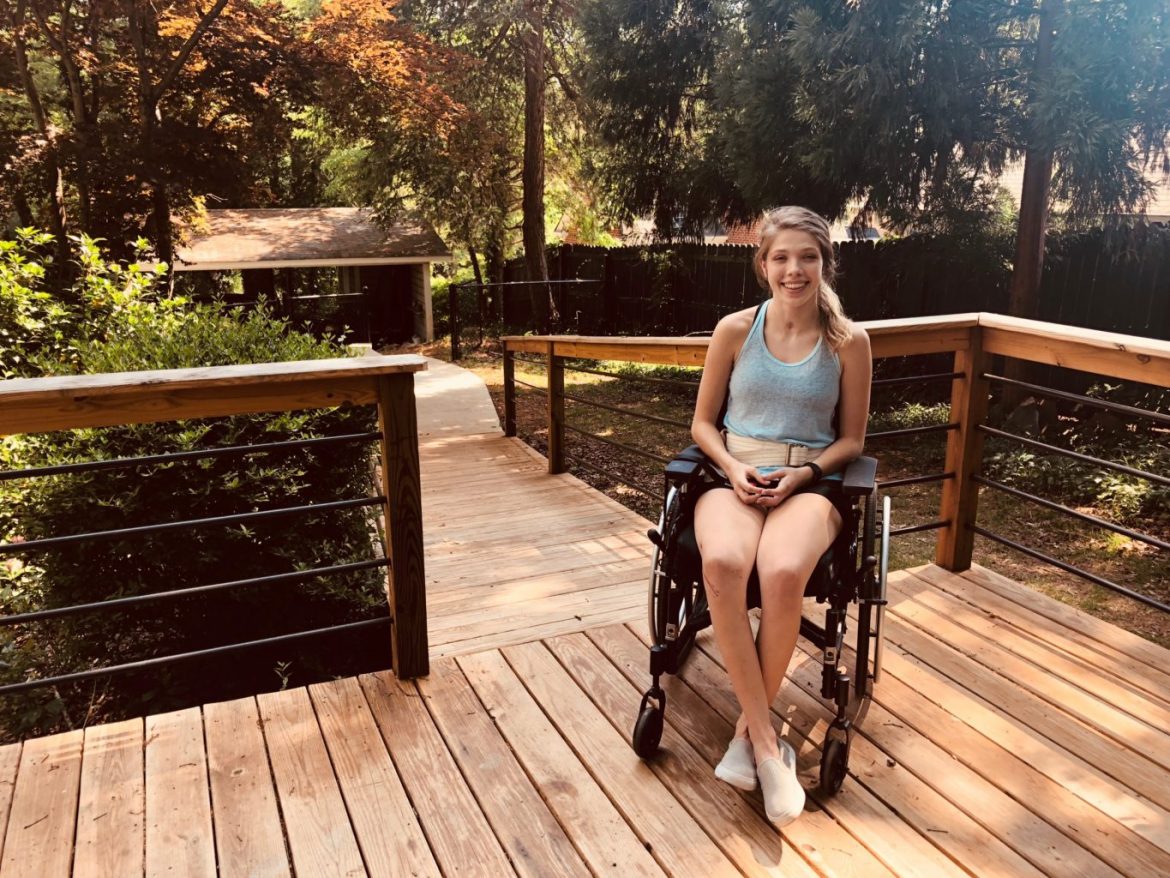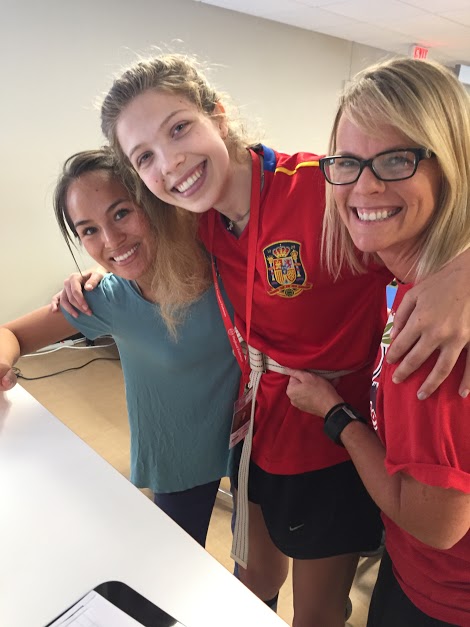Senior Karla Dougan sits on her porch that includes a ramp that was built after her accident. The ramp allows her to have access to the first floor of her house. Photo courtesy of Karla Dougan
Senior Karla Dougan recounts her emotions and experiences following a severe car accident on Dec. 31, 2016.
This isn’t the way I thought I’d spend my senior year.
I thought I would be taking college courses at the University of Georgia and having an internship somewhere. I was looking forward to driving my little brother to school every morning during his first year at Clarke Central High School.
I’d be swimming and playing soccer. I’d be going to parties and studying with my friends at Jittery Joe’s like I have for the past three years. I’d graduate from high school and be independent.
Instead, I’m relearning how to walk, write and type. I am relearning how to get myself ready in the mornings. Instead of taking on my normal course load, I’m only in school part time and I am taking two classes. I don’t drive and I can’t swim or play soccer. I never see my friends outside of school. I spend most days with my family and therapists. I’m relearning how to be independent, but I have my doubts that I will ever get there. I am graduating this year with my class and best friends, but the path was not ideal.
I don’t remember what happened.
I don’t remember it at all.
I don’t remember talking to the former firefighter who sat by my side. He talked to me until the paramedics and car lifters arrived. I don’t remember the questions he asked me and I don’t remember my answers.
I was told I asked him, “Am I going to die?” and he said, “No.”
On the day of New Year’s Eve, I was driving home on a country road. My friends texted me about the parties that night. I picked up my phone and texted back. That’s the last thing I remember.
I’d be swimming and playing soccer. I’d be going to parties and studying with my friends at Jittery Joe’s like I have for the past three years. I’d graduate from high school and be independent.
At first, I didn’t know I had an injury. I didn’t understand why I was in the hospital or what had happened to me. One night, I needed to go to the bathroom so I tried to get out of bed. As soon as I touched the floor, I fell and hit my head on the ground. Luckily I landed on a pillow, which saved me from another possible injury.
That happened four months after my accident. From that point on, I knew I could not walk, but it still took me several more weeks to remember why.

(Left) Senior Karla Dougan poses with friends (from left to right) Zoe Peterson, Caroline Stewart and Olivia Ripps at the Shepherd Center. At the center, Dougan would go down to the courtyard to get out of the hospital environment. Photo courtesy of Karla Dougan
I had many types of therapy in the hospital. Around that time I was starting to talk, so the hospital team enrolled me in a group therapy session. On the first day other patients were talking about how they got their injuries and describing the type of brain injury they had. When it was my turn to talk, I told them my name. When they asked me what kind of brain injury I had, I answered that I didn’t have one. The doctor took me out of the session early and
brought me back to my room to talk with my dad. They explained to me, for the hundredth time, that I had an anoxic brain injury.
An anoxic brain injury occurs when the brain doesn’t receive oxygen for more than two minutes. I was told that my car flipped over three times during the accident. At some point, I was ejected and landed in a ditch. My car then rolled on top of me, breaking my right leg and trapping me underneath it with little oxygen for the next thirty minutes. When the paramedics reached me I had no heartbeat, no pulse and my lips were blue. My brain wasn’t getting any oxygen, and no one knew when my heart had stopped.
After learning this, I never forgot that I had a brain injury.
Since the accident I’ve been intent on getting my life back to where it was before the accident. To fully recover, I worked hard in all areas of therapy. There are three main types of therapy. Occupational therapy works on your occupational skills, like posture, writing, typing, eating, brushing your teeth, putting on makeup and dressing yourself; basic skills that everyone needs to function in the world.
Speech therapy focuses on much more than speech: cognition, memory, voice and relearning how to swallow food.
Finally, physical therapy (PT) works on physical skills like walking, running and balance. These are all things that most people can do without thinking, but people with brain injuries have to relearn. PT was, and still is, my main focus because I am an athlete and I love to run.
When the paramedics reached me I had no heartbeat, no pulse and my lips were blue. My brain wasn’t getting any oxygen, and no one knew when my heart had stopped.
One of the most positive therapies for me was the treadmill. Because I’m a runner, it was the most exciting part of my week. To use the treadmill I was surrounded by four trained therapists. Because I couldn’t stand on my own, the therapists hooked me into a harness, which held up some of my weight and prevented me from falling. One of the therapists operated the machine, while the other three helped move my body. One therapist stood behind me to make sure I was in the correct position, while the other two were on either side helping my feet move. Although this was only a small part of my week, it helped me mentally and physically. It cheered me up.
I also remember one day when my dad was helping me improve my dexterity. He retaught me how to flick people off and got me to do it in front of all the nurses. One of my nurses scolded my dad for teaching me how to flick people off and then scolded me for flicking all of them off. Everyone laughed, though, because they were excited that I was finally making progress with my fine motor skills.
(Right) Senior Karla Dougan stands at a table with her therapists at Pathways Transitions Program in Atlanta. Dougan was at Pathways for three months following her car accident on Dec. 31, 2016. Photo courtesy of Karla Dougan
The Shepherd Center is a very supportive environment for people with brain injuries. Honestly, during my stay my therapists became my best friends. They were close to me in age and helped me stay positive at my worst moments, like when I was relearning how to eat or trying to walk. On July 4, we all went to the roof of a parking lot at Shepherd with an incredible view of Atlanta to see the fireworks.
Dying would have been easier; surviving is the hard part.
This was a cool experience because all the patients and their families came out. I met a lot of other people in similar situations. We connected, even though we had different injuries, because we all had to relearn these basic skills through intensive therapy. At an emotional level, we all had to deal with having some people treating us differently, with getting used to our new selves.
Dying would have been easier; surviving is the hard part. Since I came back home last August, I have been very hard on myself with walking, writing and schoolwork.
I can’t do the things I used to do and it makes me sad. I am surrounded by people who are not disabled, who can effortlessly do things that I want to do, and used to do, but can no longer do without great effort. I have been working on myself everyday and try not to worry about anything or anyone else because to me right now, myself and my recovery are the most important things. But I do miss my friends a lot, and my old life.
I am lucky that I still feel like the same person I was before the accident and I wish people would treat me like they did before, despite me talking differently and moving differently. I know I have a brain injury; I suffer the consequences everyday and I work everyday to get my brain back to where it was. But I don’t want my brain injury to define me.

